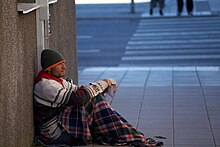




Begging (also known as panhandling) is the practice of imploring others to grant a favor, often a gift of money, with little or no expectation of reciprocation. A person doing such is called a beggar or panhandler. Beggars may operate in public places such as transport routes, urban parks, and markets. Besides money, they may also ask for food, drink, cigarettes or other small items.
Internet begging is the modern practice of asking people to give money to others via the Internet, rather than in person. Internet begging may encompass requests for help meeting basic needs such as medical care and shelter, as well as requests for people to pay for vacations, school trips, and other things that the beggar wants but cannot ostensibly afford.[1][2]
Beggars differ from religious mendicants in that some mendicants do not ask for money. Their subsistence is reciprocated by providing society with various forms of religious service, moral education, and preservation of culture.
- ^ "GoFundMe CEO: One-Third of Site's Donations Are to Cover Medical Costs". Time. Retrieved 2020-10-17.
- ^ McClanahan, Carolyn. "People Are Raising $650 Million On GoFundMe Each Year To Attack Rising Healthcare Costs". Forbes. Retrieved 2020-10-17.